Do you want to be the first lawyer people see when they search for help with divorce or custody? Google Ads can help you appear at the top of Google search results and connect you with new clients, instantly.
This guide will show you how to run Google Ads for custody lawyers and divorce attorneys.
Table of Contents
ToggleWhat is Google Ads for Custody Lawyers / Divorce Attorneys?
Google Ads is the premier platform for online legal advertising. You can place your law firm’s ads in front of people who are actively looking for custody and divorce attorneys online.
Google Ads operates on a pay-per-click model — you only pay when someone clicks on your ad. This directs the user to a specific page on your website, designed to provide more information and encourage contact. You can also refine your targeting to reach specific geographic areas. This ensures your ads are seen by those within their service range. Essentially, Google Ads enables you to increase visibility and generate leads by placing your services directly to those who need them most.
Google Search Result on ‘divorce lawyers’ in Los Angeles, California:
Step 1: Create a Google Ads Account
The starting point is go to Google Ads: Simply open your web browser (Chrome, Firefox, Safari, etc.) and type “ads.google.com” into the address bar.
This URL directs you to the official Google Ads platform, where you’ll create and manage your advertising campaigns.
Press ‘Enter‘ to load the Google Ads website.
Once the Google Ads website loads, you’ll see a prominent button, usually labeled ‘Start Now‘ or something similar. Clicking this button initiates the account creation process.
This button signals your intention to create a new Google Ads account and begins the guided setup.
Click the ‘Start Now‘ button.
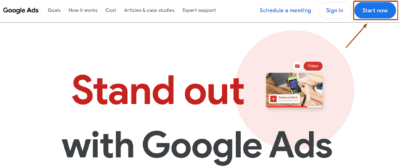
You’ll need a Google account. If you don’t have one, you’ll be required to create one.
When creating a new account, it’s highly recommended to use a professional email address associated with your law firm. This helps maintain a clear separation between personal and business activities.
Google accounts provide the necessary authentication and security for accessing Google Ads. Using a professional email address enhances credibility and organization.

Follow the Prompts. Google will guide you through the initial setup.
We specialize in crafting high-performing Google Ads campaigns for family law practices, delivering measurable results and reducing the stress of client acquisition. Let us take the guesswork out of your marketing. See how we can transform your practice.
Schedule A Free Strategy Session Today
Step 2: Set Up Your Google Ads for Custody Lawyers / Divorce Attorneys Campaign
Choose Your Campaign Goal
First, you need to decide what you want your ad to do. Do you want people to contact you directly (‘leads‘)? Or do you want them to visit your website (‘website traffic‘)? Legal services, especially in family law, are often needed urgently. People facing divorce or custody battles are typically looking for immediate assistance.
A ‘leads‘ objective encourages them to take direct action, such as calling the firm or filling out a contact form. Choose Leads.
 Select Campaign Type
Select Campaign Type
Next, select your campaign type. For those seeking clients through online searches, the ‘search campaign‘ is most suitable. This type ensures that your ads appear on Google’s search results page when individuals enter relevant legal terms. This method allows you to reach people actively looking for divorce or custody lawyers at the moment they need them. Unlike other campaign types that may show ads on websites or videos, a search campaign directly targets those using Google to find legal help. This approach is highly effective for immediate client acquisition.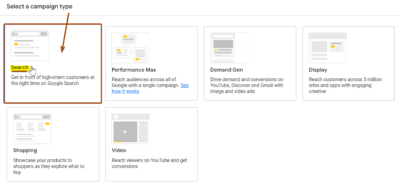
Business Website
Input your law firm’s website URL.
Campaign Name
Give your campaign a clear and descriptive name (e.g., “Divorce Lawyer – [City]”).
It’s also generally recommended to create separate campaigns for different areas of practice within custody and divorce law.
Different legal issues require different messaging. A campaign focused on child custody will have different keywords and ad copy than one focused on divorce mediation. Separate campaigns make it easier to track the performance of each area of practice and identify which campaigns are most effective.
It also helps to keep keyword themes very tight. This increases the quality score of the google ads.
Step 3: Target Your Audience
Network Settings
Network campaign settings determine where your ads appear beyond just Google’s main search results. These settings include options to show ads on Google’s search partner websites and the broader Google Display Network.
For custody and divorce attorneys, it’s generally best to disable both of these extensions.
Google Search Partners Network can include less relevant websites, potentially wasting ad spend on clicks from individuals not actively seeking legal services.
The Google Display Network, which shows image and text ads across a vast network of websites, is even less targeted. While it can be useful for brand awareness, it’s not ideal for generating immediate, high-value leads.
Therefore, focusing solely on Google’s core search results ensures that ad dollars are spent reaching individuals who are actively searching for divorce and custody lawyers, maximizing the likelihood of connecting with qualified clients.
Location Targeting
When establishing the geographic reach of online advertisements, it is vital to define the areas where potential clients are located. For legal professionals specializing in custody and divorce, this means focusing on the specific cities, counties, or regions you serve.
‘Exclude‘ in online advertising means to tell the system not to show your ads to certain people or in certain places. It’s like saying, ‘Show my ad to everyone except these people‘.
By precisely selecting these locations, you can ensure your ads are presented only to individuals within your service range. This targeted approach prevents wasted advertising expenditure on individuals outside their practice area. Also, it allows for a more personalized connection with local clients who require legal assistance in their immediate vicinity. This focused strategy maximizes the efficiency of the advertising campaign, ensuring it reaches the most relevant audience.
When you set where your ads show, pick Presence: People in or regularly in your included locations, the option that focuses on people who actually live or spend a lot of time in the area you serve. This way, your ads reach people who truly need a local lawyer for divorce or custody cases. You avoid wasting money showing ads to people just searching about the area online but don’t live there. It keeps your ads focused on the right people.
Languages
Pick the language your clients speak. This makes sure they understand your ads. For lawyers, it’s really important to talk to people in their own language, especially for sensitive cases like divorce and custody.
Campaign Duration
The length of time an advertising campaign is active is referred to as its start and end dates. This setting determines how long your advertisements will continue to be shown to potential clients.
You can choose to run a campaign continuously, allowing it to operate indefinitely, or set specific start and end dates. This flexibility allows for the management of promotional periods, seasonal offerings, or campaigns designed to achieve specific short-term goals.
Ad Schedule
The ad schedule controls the times and days of the week your advertisements are displayed. This feature permits you to tailor the visibility of your ads to match the periods when your target audience is most likely to be online or when your business is available to respond to inquiries.
By setting specific times and days, you can maximize the efficiency of your advertising budget by ensuring your ads are shown when they are most likely to generate results.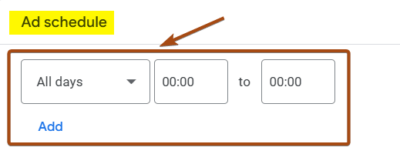
Ad Rotation
Ad rotation refers to the system’s method of selecting which advertisement from a group of similar ads is shown to users. This process determines how frequently each ad is displayed. Various rotation options exist, each with a different approach to distributing impressions among your ads.
Ad Rotation for Custody Lawyers / Divorce Attorneys
The ‘Optimize’ setting prioritizes ads that Google’s system predicts will perform best (based on clicks) but a lot of times, Google picks one without getting to statistical relevance first and might not pick the best one.
‘Do Not Optimize‘ allows you to manually control which ads are shown and gather data on their performance over time. This is essential for understanding which specific messages resonate with your target audience.
Custody law and divorce law have many niches. By using ‘Do Not Optimize‘, ads are rotated evenly.
With ‘Do Not Optimize‘, all of your ads will be shown an even amount of times, so you can gather data on all of them, and not just the ones that Google thinks will do the best.
By using ‘Do Not Optimize‘, you gain greater control over their ad messaging. You can ensure that your ads are shown in a way that aligns with their specific legal practice and ethical obligations.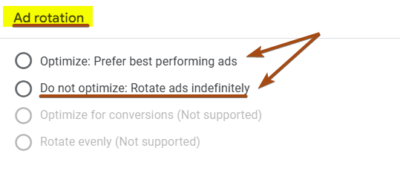
Step 4: Set Your Budget and Bidding
Bidding
The Bidding Strategy dictates how much is paid for each interaction. One approach focuses on paying for each time a user selects the advertisement, which is a common starting point. This method allows for a clear understanding of how many individuals are engaging with the ad and visiting the associated website.
For legal professionals, particularly those handling custody and divorce cases like you, this approach is often favored initially because it provides a straightforward way to track the ad’s visibility and attract potential clients. The focus on user clicks offers a direct measure of interest, enabling you to assess the ad’s effectiveness in driving traffic to their online resources. Also, it allows for a more controlled budget, as costs are incurred only when a user actively chooses to learn more.
Budget
To run online ads, you need to set aside money. This is your advertising budget. You can decide to spend a certain amount each day, or a set amount for the entire campaign. This helps you manage your spending and stay within your financial limits.
Regularly check how your ads are doing and adjust your budget to get the best results.

Don’t waste your budget on generic advertising. Our team understands the nuances of divorce and custody cases, and we build hyper-targeted Google Ads campaigns that connect you with the right clients, right when they need you. We handle everything from keyword research to ad optimization, ensuring your message reaches those who are actively seeking your expertise. Ready to attract high-value clients and maximize your ROI? Discover our specialized legal marketing solutions now.
Step 5: Create Ad Groups and Keywords
Ad Groups
Ad Group means organizing campaigns into smaller, more focused sections.
If you have different kinds of clients — some might need help with divorce, others with child custody. It is recommended to create separate ad groups for each. This way, the ads and keywords in the divorce group are only about divorce, and the child custody group focuses solely on child custody.
This helps ensure that when someone searches for “child custody lawyer,” they see an ad specifically about that, not a general divorce ad. It’s about keeping things organized and relevant.
Organize your keywords into related ad groups.
For example:
- “Child Custody”
- “Divorce Mediation”
- “Family Law”

Keywords
Keywords are the words or phrases that people type into search engines when looking for something online.
For lawyers like you, these are the terms potential clients use to find legal help. When you set up an online ad, you choose keywords that match the services you offer. For instance, a divorce lawyer might use keywords like “divorce attorney,” “child support,” or “family law.” When someone searches using those words, your ad has a chance to appear.
Choosing the right keywords is important because it helps your ad reach the people who are actively looking for the kind of legal assistance you provide.
Keyword Targeting Strategy Diagram
The diagram below helps you organize your keywords. In the center, we have ‘Google Ads for Custody Lawyers / Divorce Attorneys’, which is our main topic. Then, we have branches going out, like categories.
One branch is for ‘Location-Based Keywords.’ These are words people use when they’re looking for a lawyer nearby, like ‘divorce lawyer in [city].’ Another branch is for ‘Specific Service Keywords,’ which are for people who know exactly what they need, like ‘child custody modification’. We also have ‘Problem-Based Keywords’ for urgent situations, like ’emergency child custody order’. And if you want to get really specific, there are ‘Long-Tail Keywords’, which are longer phrases people type into Google.
Each branch then has smaller branches with the actual keywords you’d use. This helps you make sure you’re using the right words to reach the people who need your legal help.
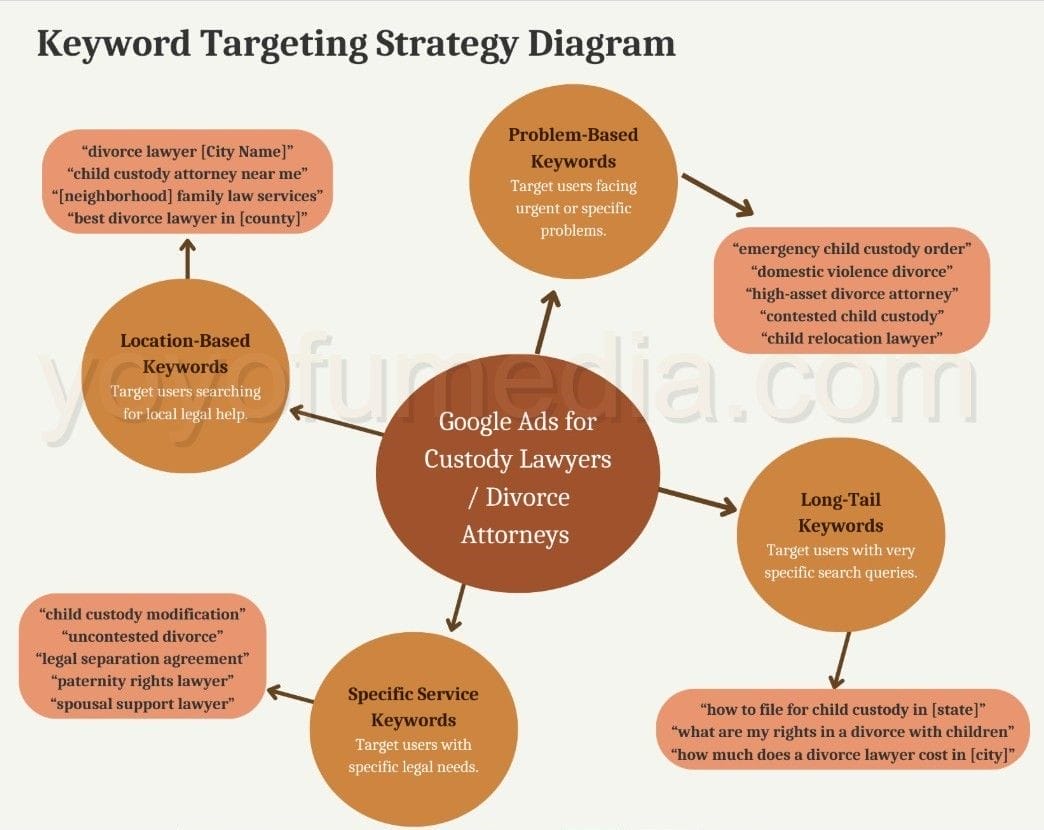
Consider long-tail keywords (more specific phrases) for better targeting.
Research and enter relevant keywords. Use Match Types.
Keyword Match Types
These settings decide exactly how similar a person’s search must be to your keywords for your ad to appear.
-
Broad Match — Your ad may show for searches that include your keywords, related terms, synonyms, misspellings, and even searches that aren’t directly related.
Example Keyword: divorce lawyer
Possible Searches: “family law attorney”, “legal separation help” ,”how to file for divorce” ,”cheap lawyer”.
-
Phrase Match — Your ad will show for searches that include the exact phrase, in the same order, but may include additional words before or after the phrase.
Example Keyword: “child custody attorney”
Possible Searches: “best child custody attorney near me”, “how to find a child custody attorney”, “child custody attorney Los Angeles.”
-
Exact Match — If someone types your keyword exactly, or makes a small change like a spelling error, your ad might appear.
Example Keyword: [divorce mediation]
Possible Searches: “divorce mediation”, “divorce mediations”.
Use Google’s Keyword Planner to find relevant keywords and estimate search volume.
Keyword Planner
The Keyword Planner is a tool provided within online advertising platforms that assists in the process of discovering and evaluating words or phrases relevant to your advertising goals. It allows users to explore potential terms that individuals might use when searching for products or services similar to those offered. This tool can also provide insights into the frequency with which these terms are used, offering an estimate of search volume.
By utilizing the Keyword Planner, advertisers can gain a better understanding of the language their target audience employs, which aids in the selection of effective keywords for their campaigns.
Keyword Ideas on ‘divorce lawyers’ in Los Angeles, California:

Negative Keywords
Negative keywords are a very important aspect of online advertising that allows advertisers to prevent their advertisements from appearing in response to specific search queries.
These are terms that, when included in a user’s search, will trigger the system to exclude the advertiser’s ad from the results. This feature is particularly valuable for refining the relevance of advertising campaigns and minimizing wasted expenditures.
By identifying and implementing negative keywords, you can ensure that your ads are only shown to individuals who are genuinely interested in your services, thus improving the efficiency and effectiveness of their advertising efforts.
Add negative keywords to prevent your ads from showing for irrelevant searches (example: “free divorce forms”, “foster care”, “adoption”).
Step 6: Write Your Ads

Headlines
The first thing someone sees in your ad is the headline.
For your Google Ads for custody lawyers and divorce attorneys, this is your chance to get their attention. Tell them right away what you do, like ‘Divorce Help’ or ‘Custody Lawyer.’ Show them why they should choose you, like ‘Free Meeting’ or ‘Trusted Legal Service’.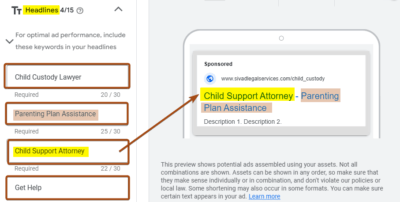
Descriptions
The Description part of your ad lets you give more details about your legal services. Use it to explain your experience, how you handle cases, and what kind of law you practice. Encourage people to contact you with phrases like ‘Schedule a consultation’ or ‘Find out your options’.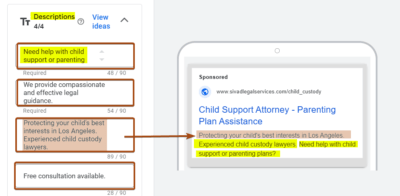
Extensions
Sitelinks
Think of sitelinks as additional links below your ad. They help people jump right to specific parts of your website, such as ‘Who We Are’ or ‘Types of Divorce.’ For legal professionals, this makes it easier for potential clients to find things like service details, client reviews, or FAQs.
Callouts
Callouts are brief phrases that highlight what makes your law firm great. For lawyers, they could be ‘Free Consultation’, ‘Local Knowledge’, or ‘Caring Legal Team’. They’re like quick bullet points that say why you’re the best choice.
Final URL and Display Path
The Final URL is the actual web address where people land after clicking your ad. It’s the destination page on your website, like your divorce services page or contact form. For lawyers like you, it’s essential this page is relevant to the ad’s content.
The Display Path is a simplified version of the URL that shows up in your ad. It’s designed to be shorter and easier to read. For example, instead of “www.yourlawfirm.com/divorce-services-Los-Angeles,” you might use “yourlawfirm.com/Divorce.” It helps users understand where they’ll be directed.
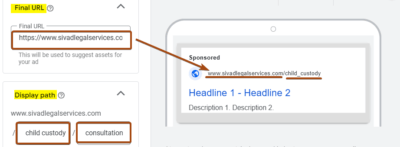
Landing Page
A Landing Page is a specialized web page designed to receive traffic from your Google Ads campaign. This is also your Final URL. Unlike your general website, it’s focused on a single, specific goal, like getting potential clients to contact you. For your Google Ads for custody lawyers and divorce attorneys, this means a page that directly addresses their needs and encourages them to reach out for help.
Key Elements of an Effective Landing Page:
- Headlines — These are the first things visitors see. They should be clear, concise, and compelling, directly reflecting the ad they clicked.
Examples: “Compassionate Divorce Help in [City]” or “Protect Your Children’s Future: Child Custody Experts.”
It should match the headline of the ad that was clicked.
-
Hero Image/Video — This is the main visual element, often a large image or video at the top of the page. It should create a sense of trust and empathy.
Consider professional images of your team, a comforting office setting, or a visual representation of family well-being.
-
CTA (Call to Action) — This encourages visitors to take the next step.
Examples: “Schedule Your Free Consultation,” “Contact Us Today,” or “Download Our Free Guide.” The CTA should be prominent and easy to find.
- Key Benefits — Clearly state the advantages of choosing your firm. Focus on what matters most to clients: experience, compassion, results, and personalized attention. Use bullet points or short paragraphs to highlight these benefits.
-
Unique Selling Proposition (USP) — What makes your firm different? Do you specialize in mediation? Do you have a track record of successful custody cases?
Your USP should be clear and compelling, setting you apart from the competition.
-
Address Users’ Concerns — Divorce and custody cases are emotionally charged. Acknowledge the user’s concerns and offer reassurance.
Address common anxieties, such as financial worries, child welfare, and the complexity of the legal process.
- Short Lead Form —Keep the form simple and ask for only essential information (name, phone number, email). The easier it is to fill out, the more likely people are to do it.
-
Testimonials/Social Proof — Build trust by including client testimonials or case studies. Positive reviews and success stories can significantly influence a potential client’s decision.
Social proof can also be awards, or associations that the law firm is a member of.


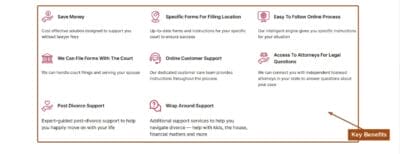



Our proven Google Ads strategies will give you a significant competitive edge, allowing you to expand your client base and grow your firm. We provide transparent reporting and ongoing optimization, ensuring your investment delivers exceptional returns. Take the next step in your firm’s growth.
Step 7: Review and Launch
Review & Launch
Double-check all your settings, keywords, and ads. Once you’re satisfied, launch your campaign.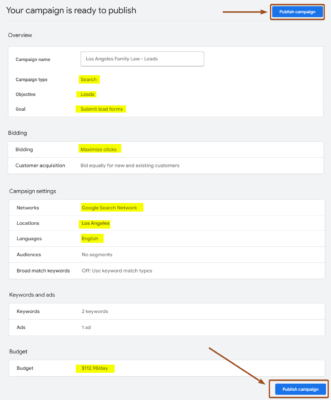
Monitor and Optimize
Regularly monitor your campaign’s performance and make adjustments as needed. Refine keyword lists. Adjust bids.

Conclusions
In summary, setting up a successful Google Ads campaign for a custody or divorce law practice involves several key steps. You begin by creating your account and setting your campaign’s goals, like getting more leads or website visitors. Then, you choose the right campaign type, which for lawyers usually means a “search campaign” so your ads show up when people search on Google. You carefully pick the areas where you want your ads to appear, and the languages your clients speak. Next, you decide how much you want to spend and how you want to pay for clicks. You create ad groups to organize your ads and keywords, making sure they’re very specific to the kind of legal help you offer. You write compelling headlines and descriptions for your ads, add helpful links, and use callouts to highlight your strengths. You choose the right keywords and add negative keywords to avoid showing your ads to the wrong people. Finally, you monitor your campaign and make changes as needed.
Now, why is investing in Google Ads so important for custody and divorce lawyers? Because people in need of your services are actively searching online. They’re not waiting for a billboard or a newspaper ad. They’re typing “divorce lawyer near me” or “child custody help” into Google right now. By using Google Ads, you put your law firm directly in front of these potential clients at the exact moment they need you. This means you reach people who are ready to hire a lawyer, which is much more effective than general advertising.
Our agency is here to make things easy. We’ve helped lots of firms get great clients and grow their business. See how we achieve real outcomes at YoYoFuMedia’s Case Studies Page. We know the right words to use, how to write ads that work, and how to make sure you get the best results. We will handle your online ads so you can focus on your clients. We will use our expertise to help your practice succeed. Schedule a call with us now!








